

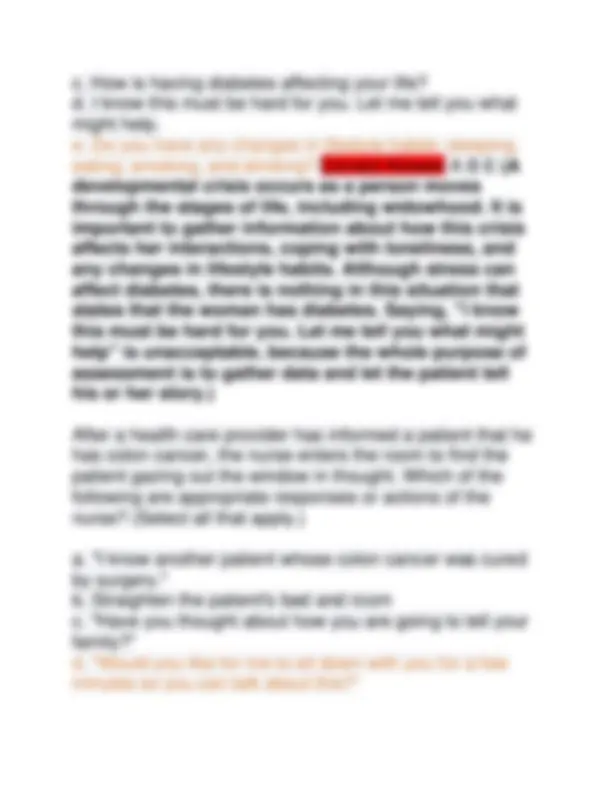

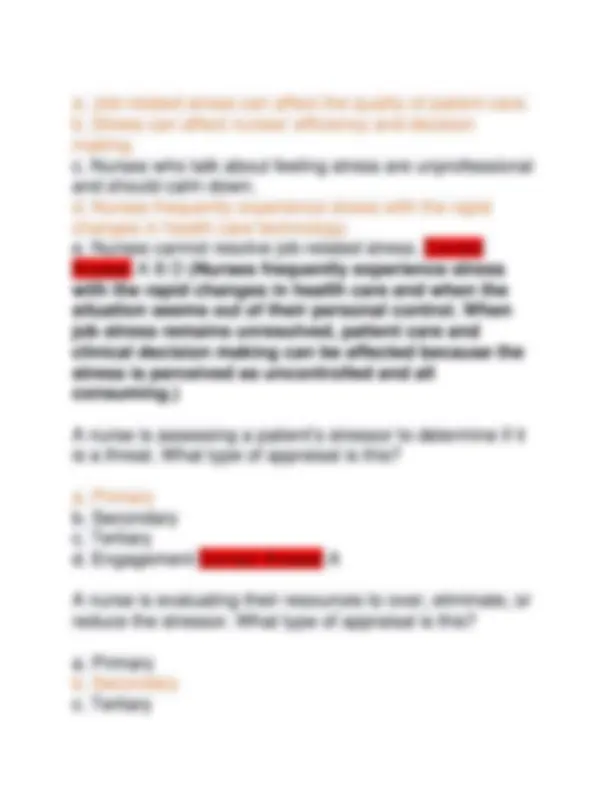


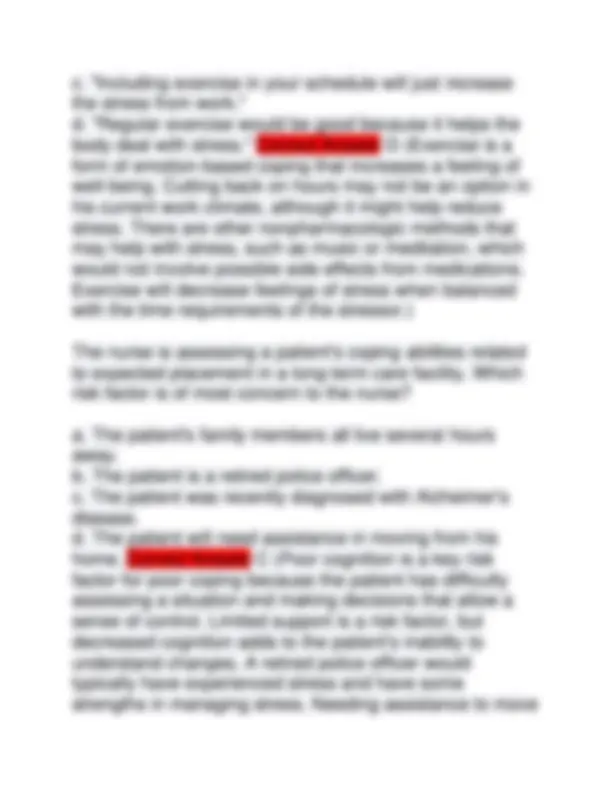




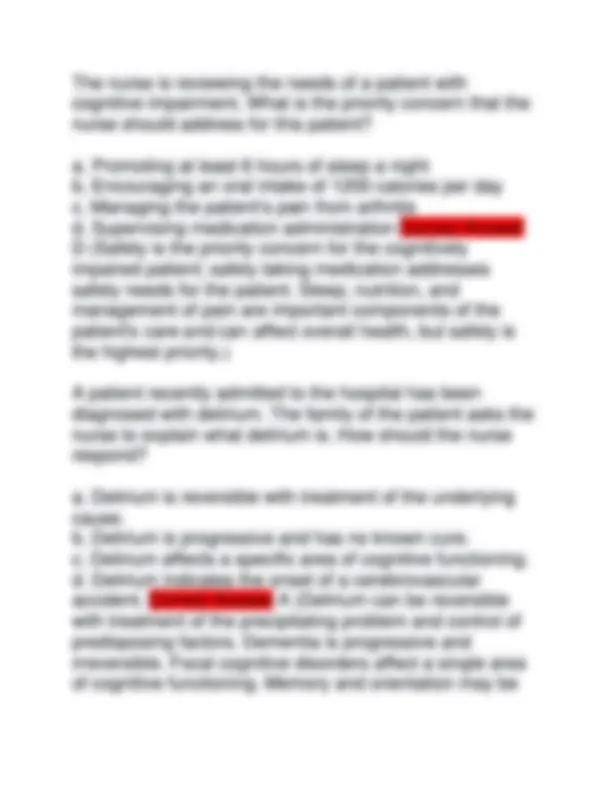
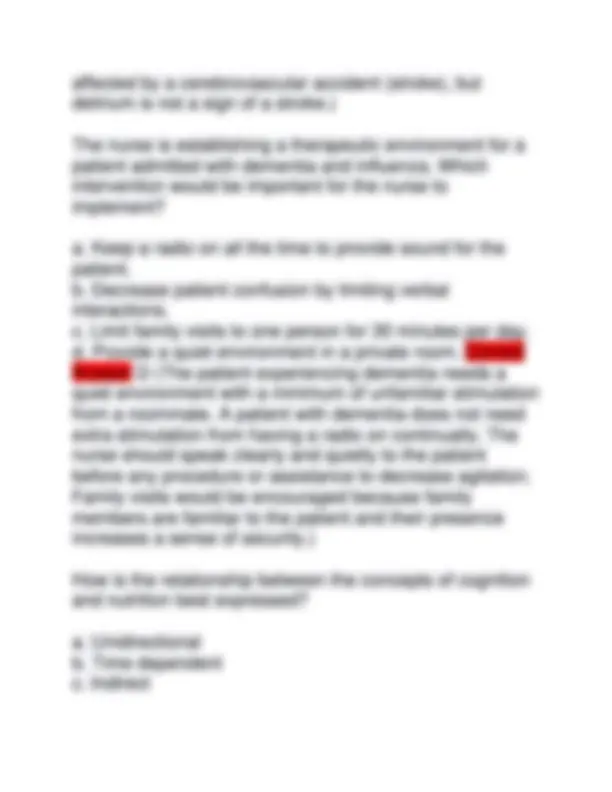
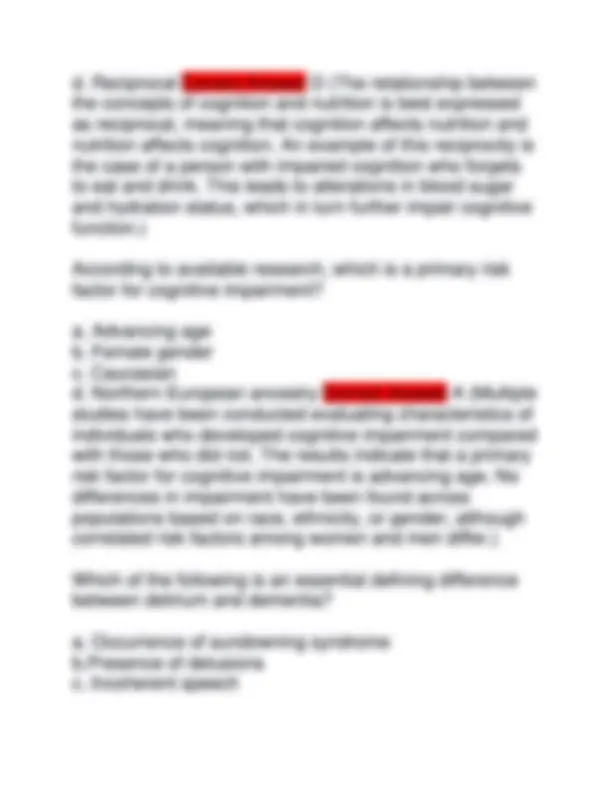
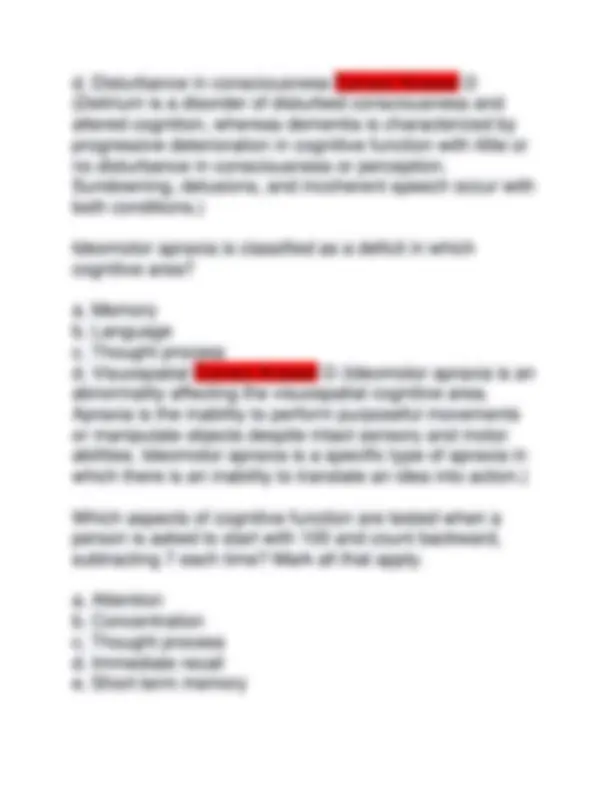
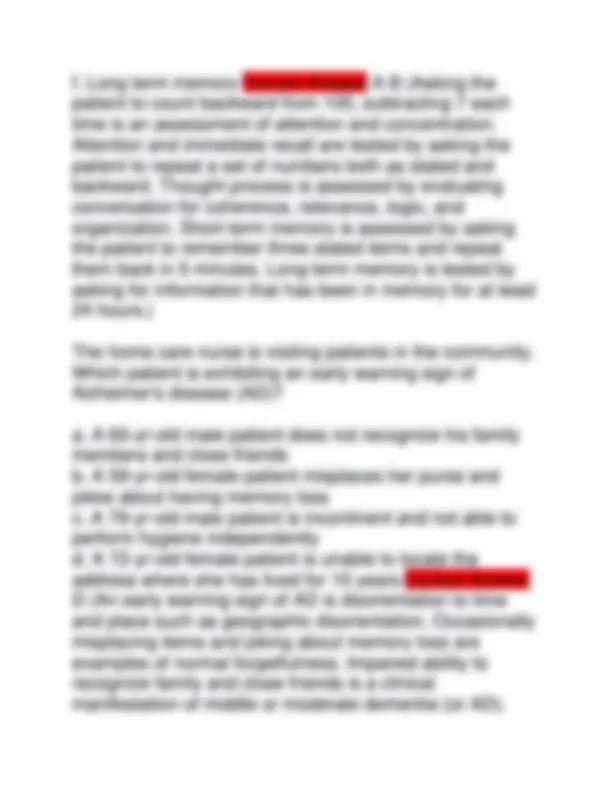
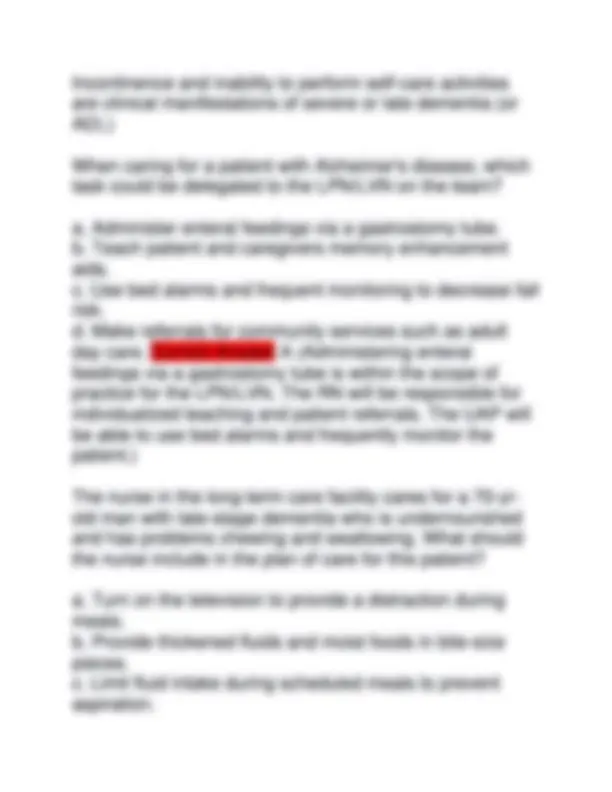
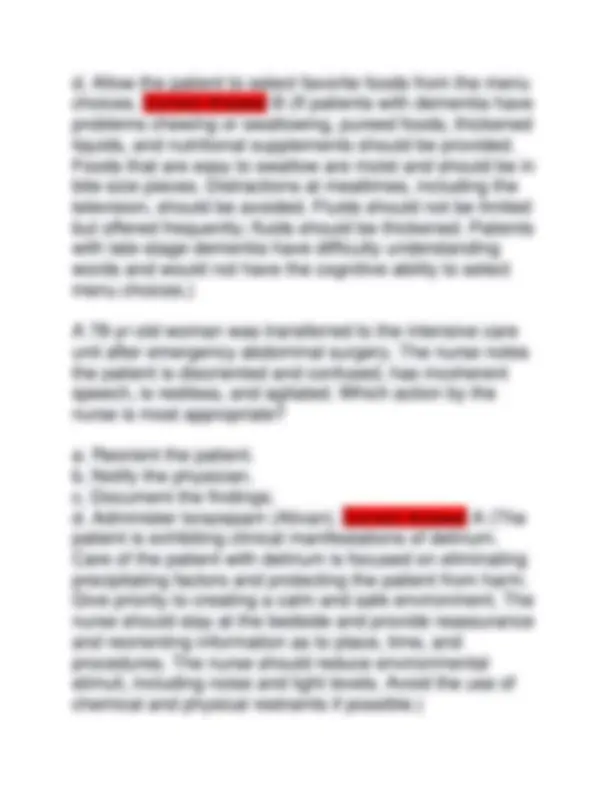

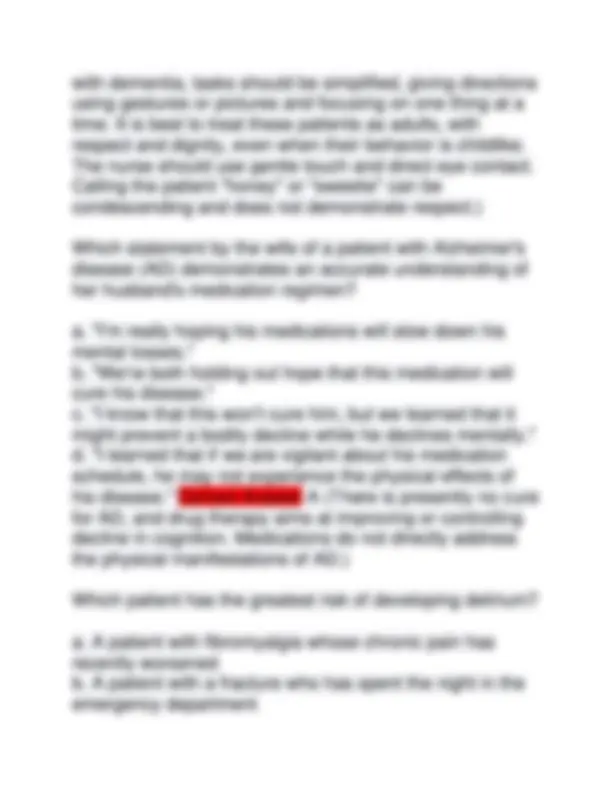



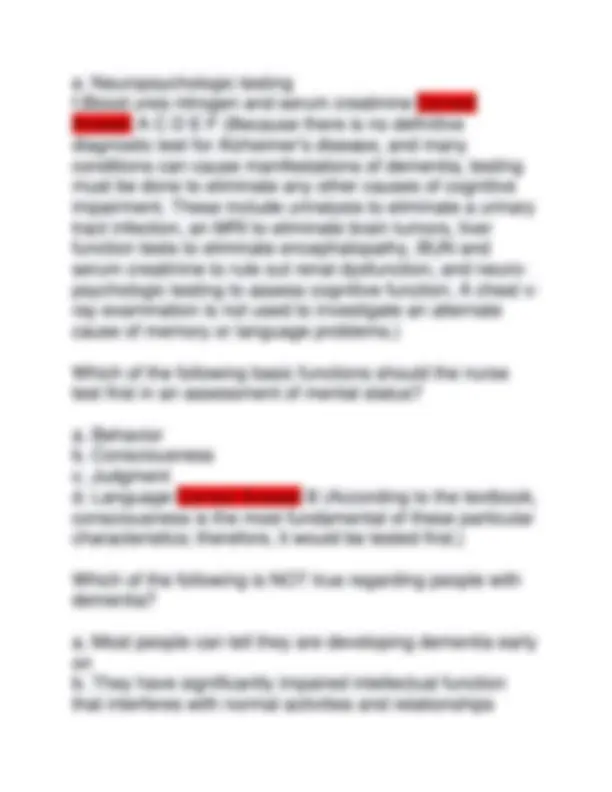




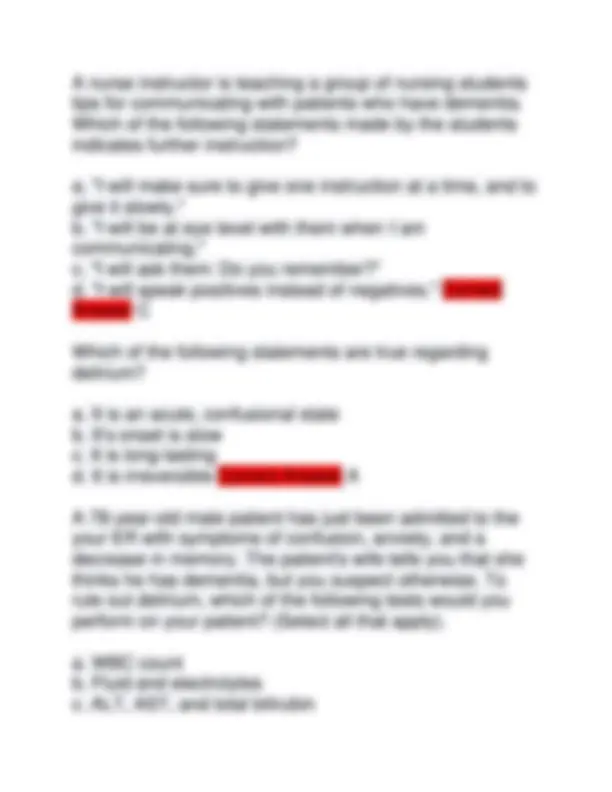

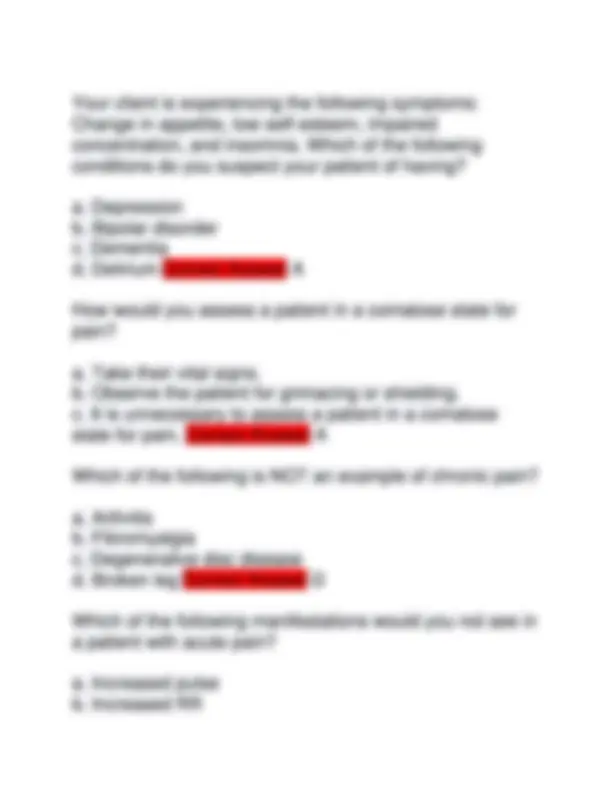
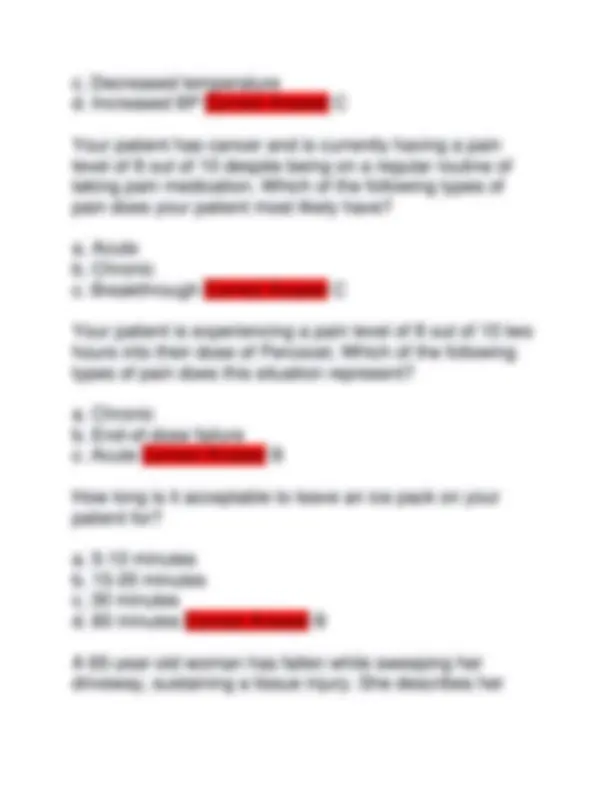
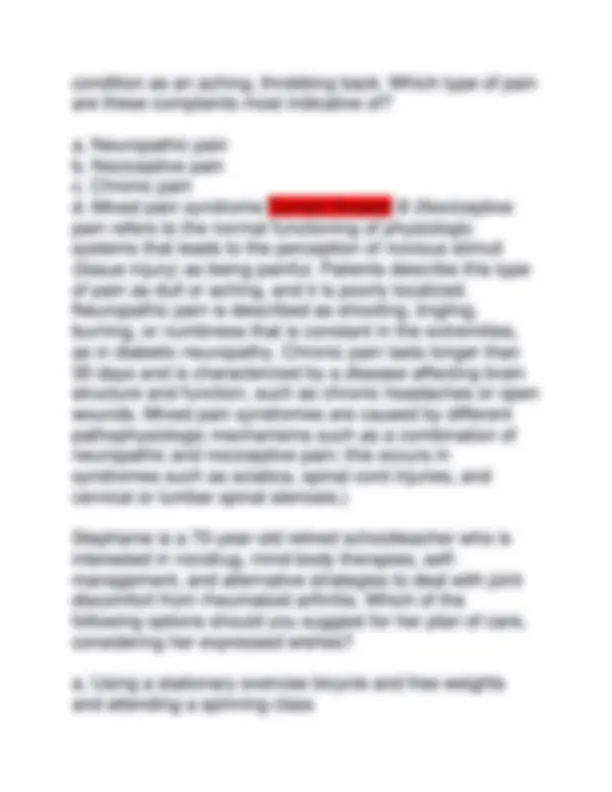


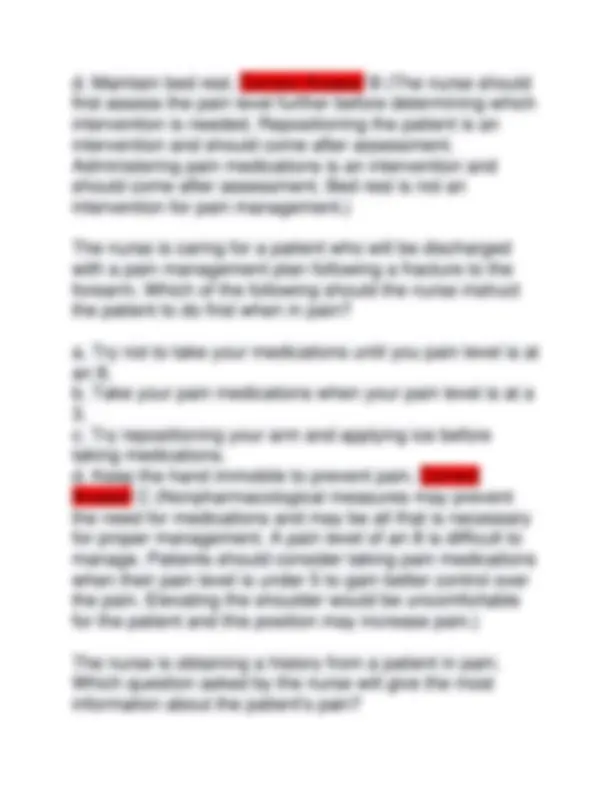
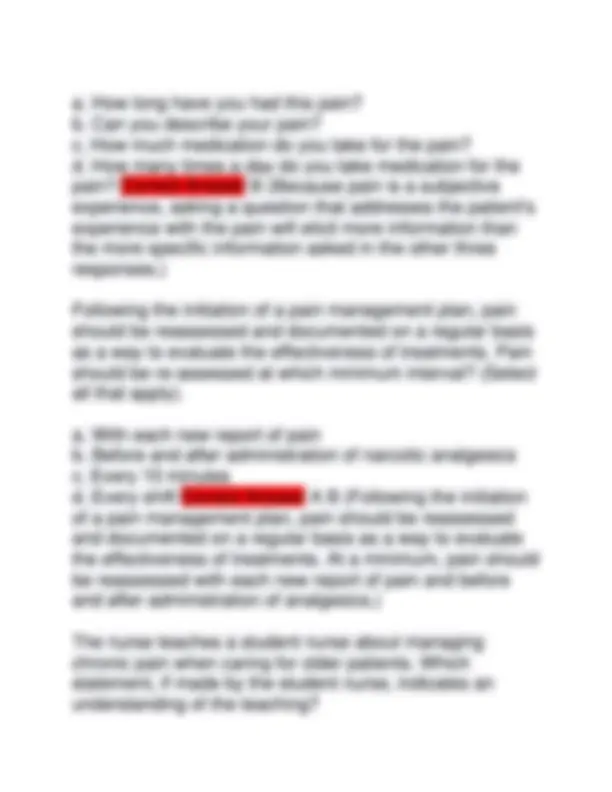


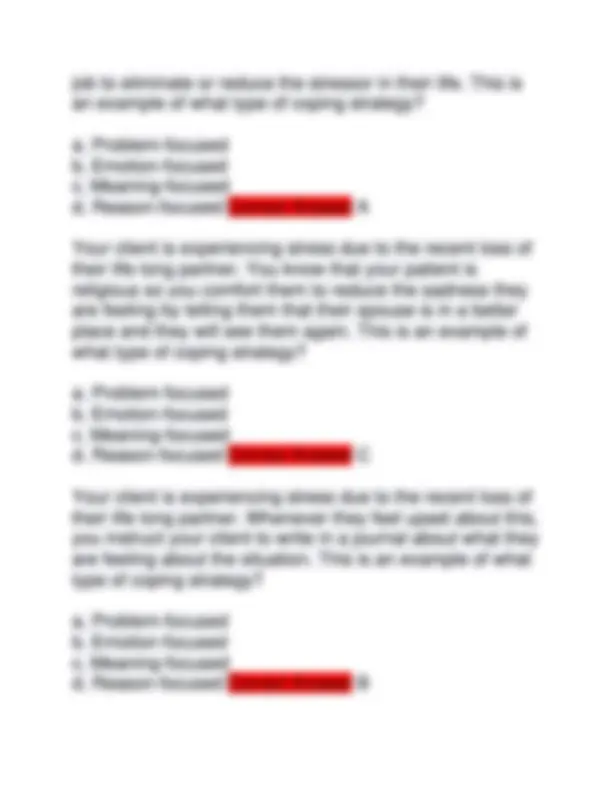

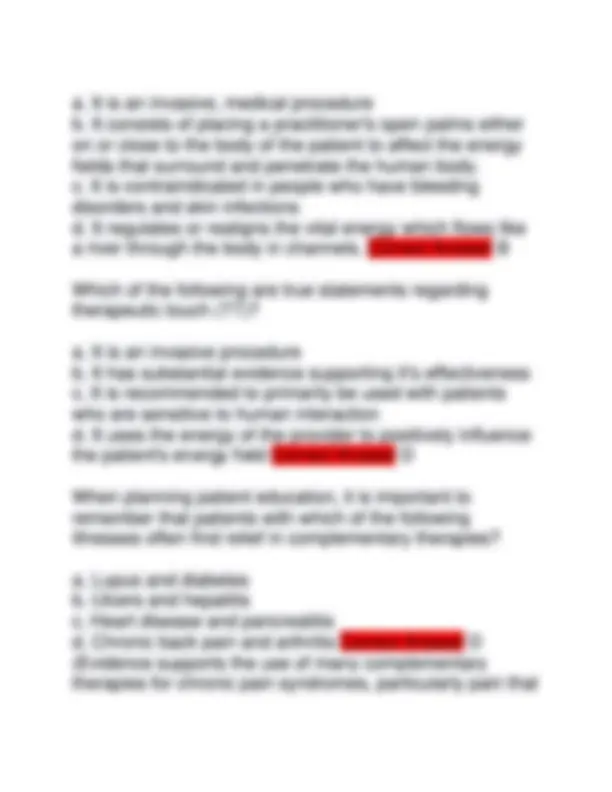



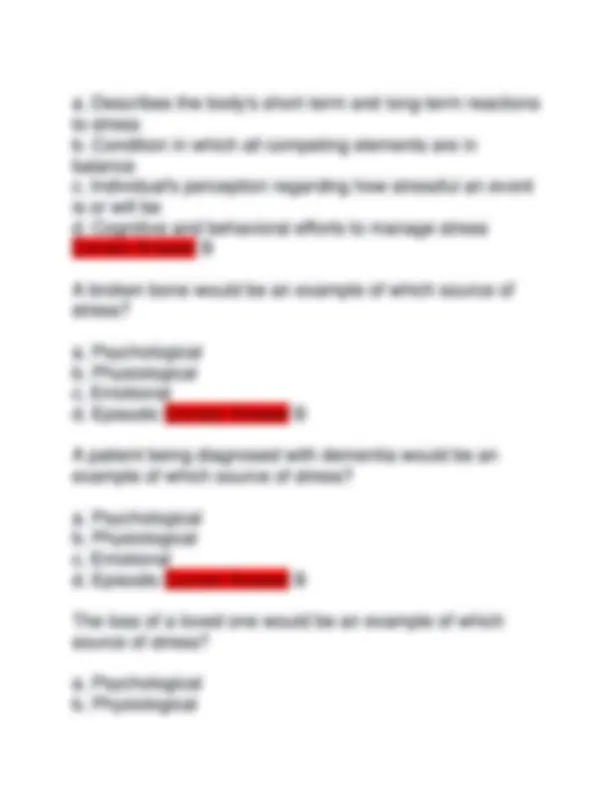
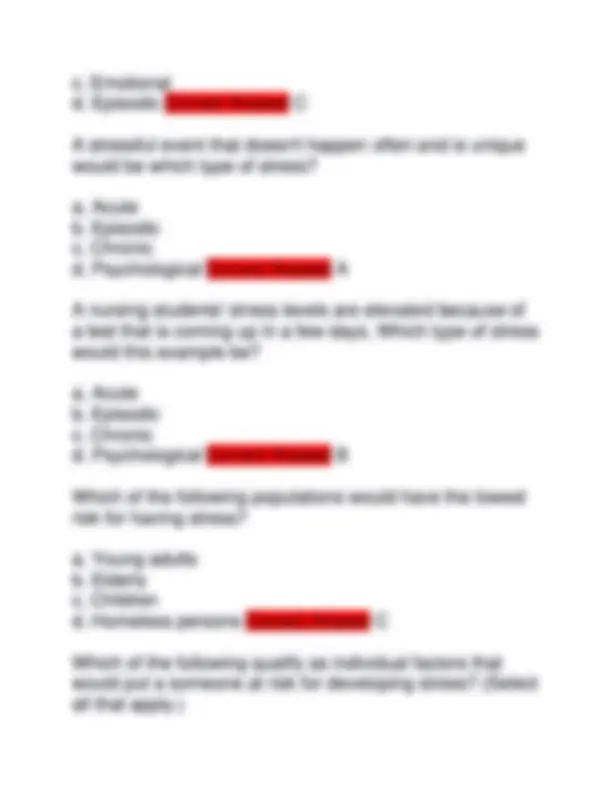
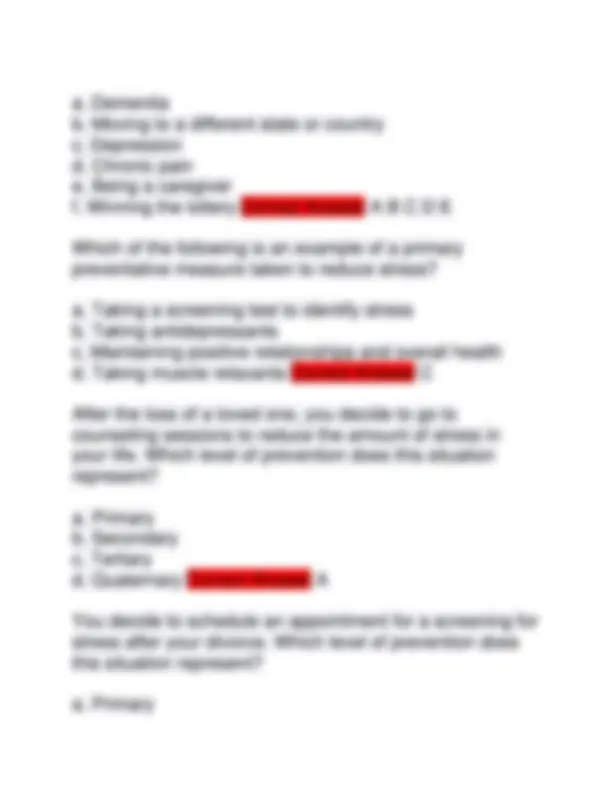
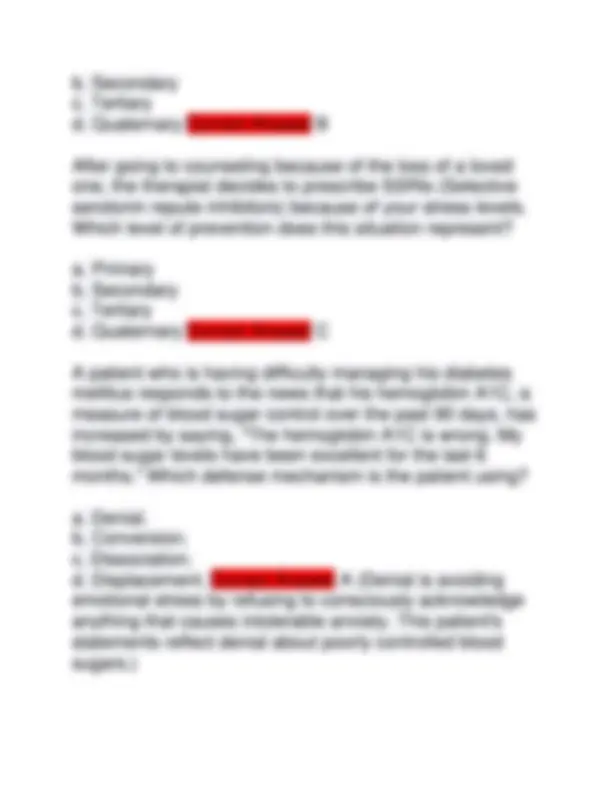


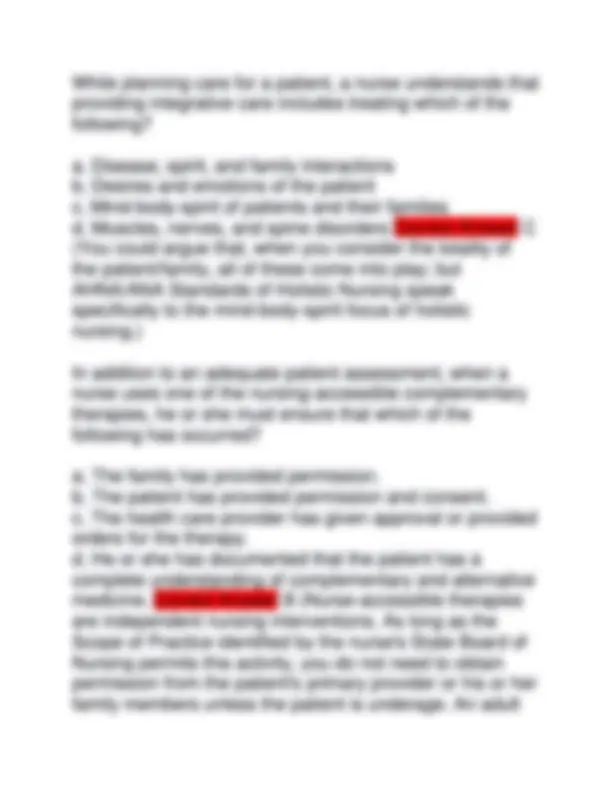
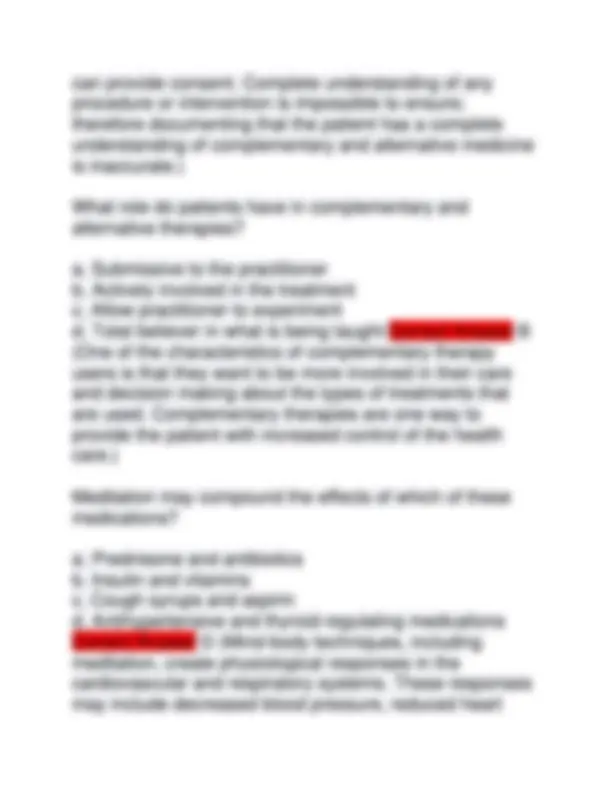
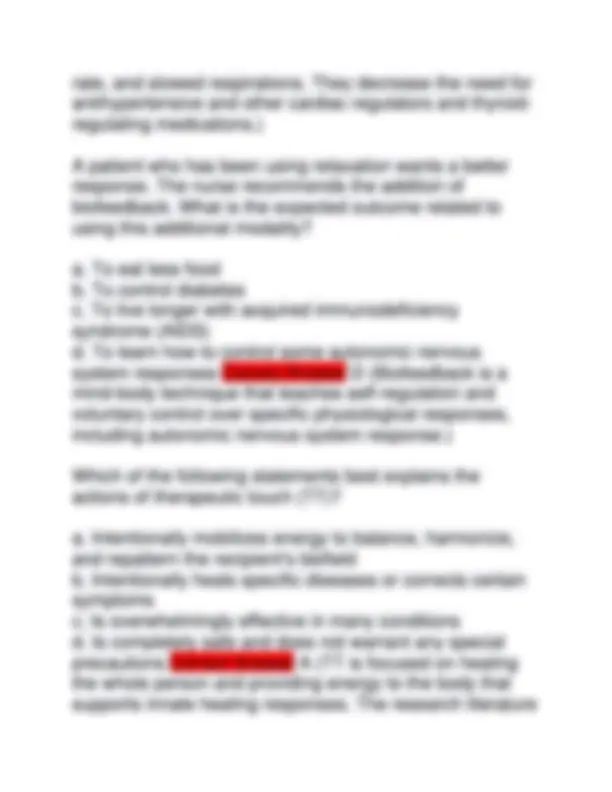
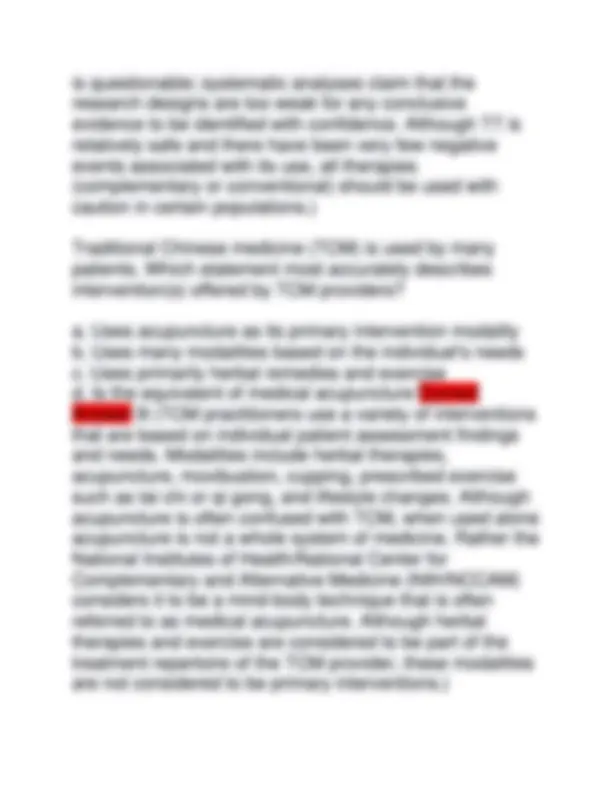
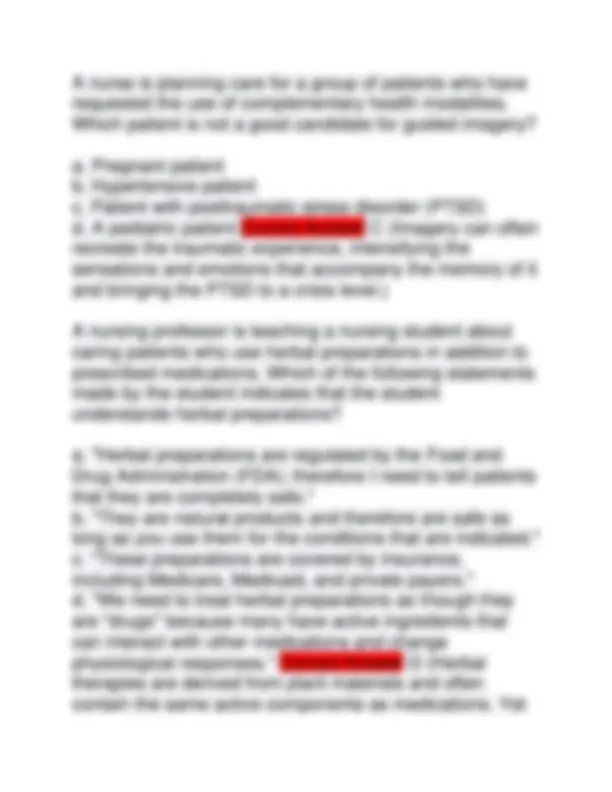


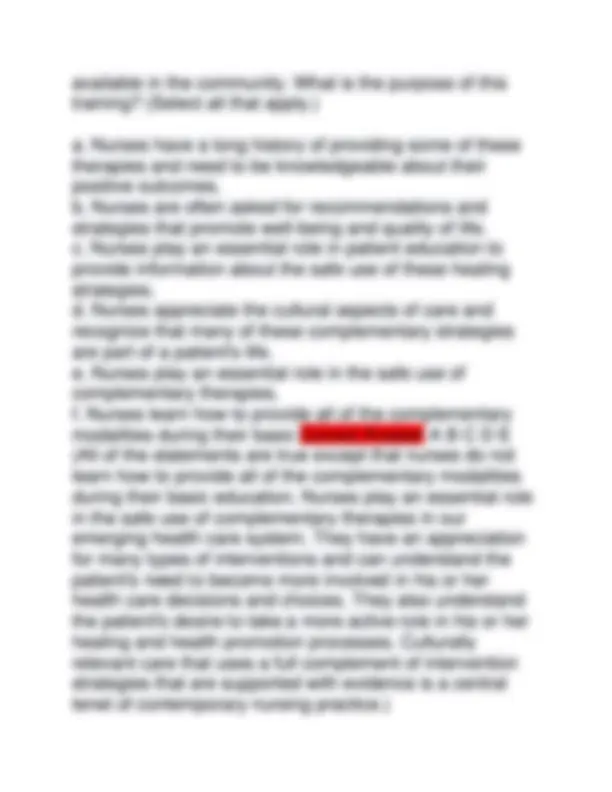
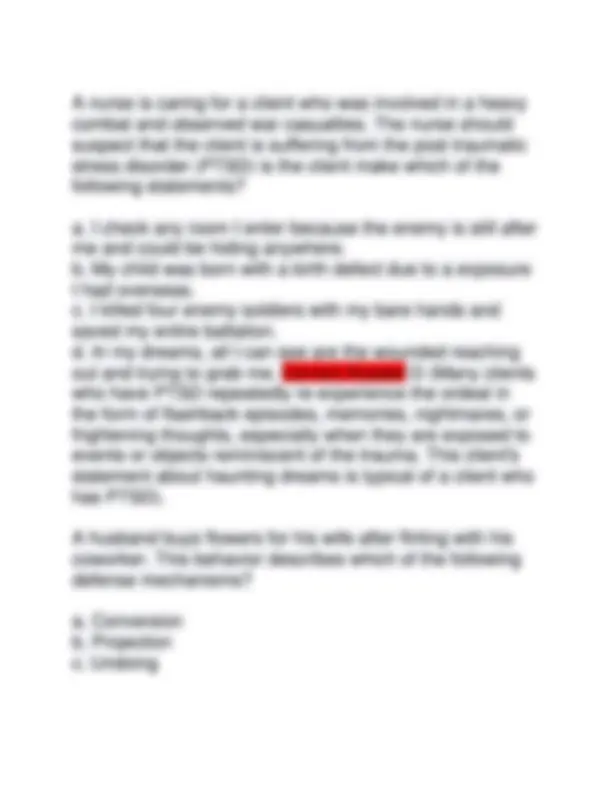
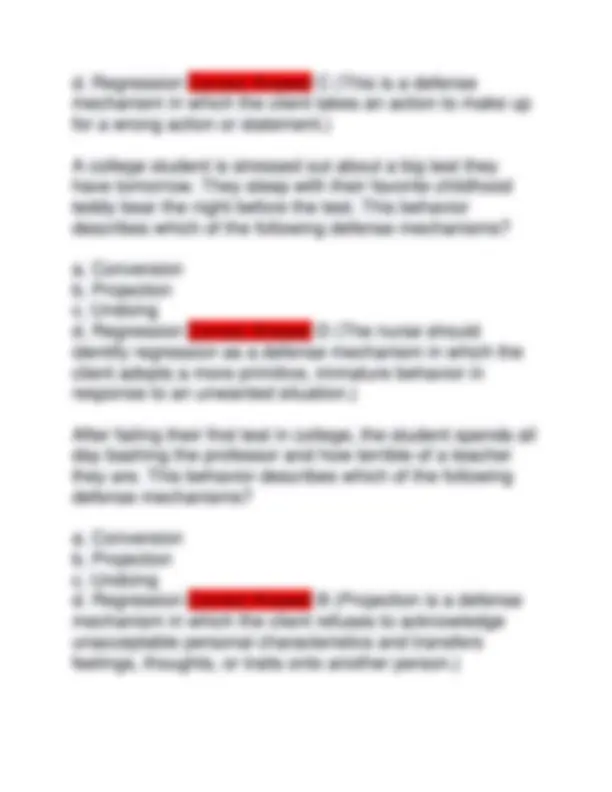
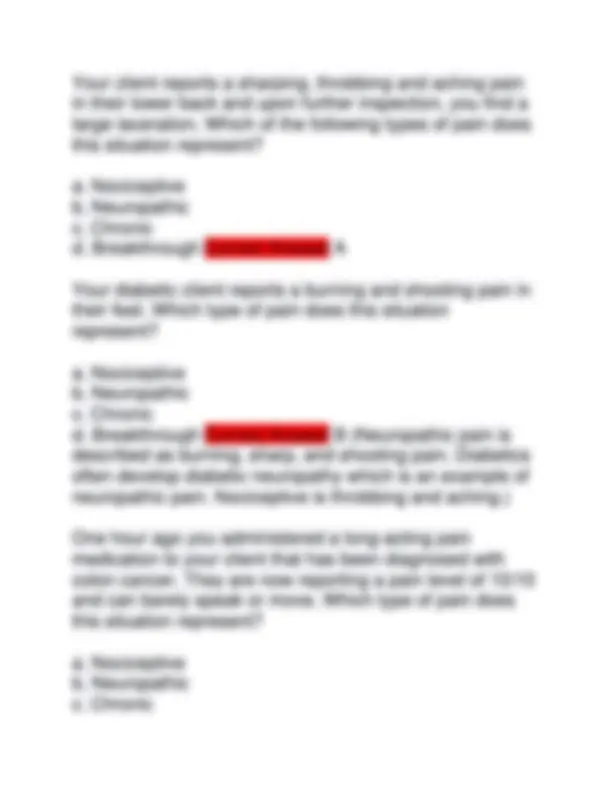


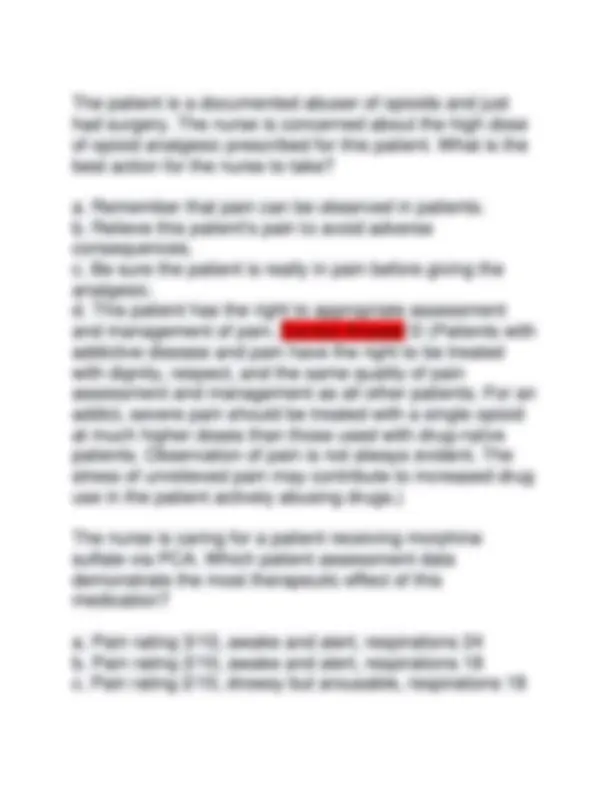


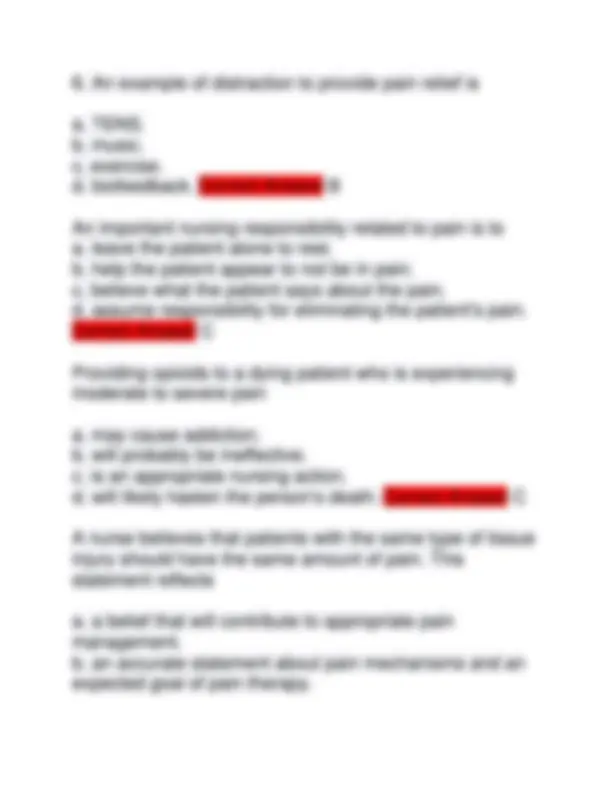
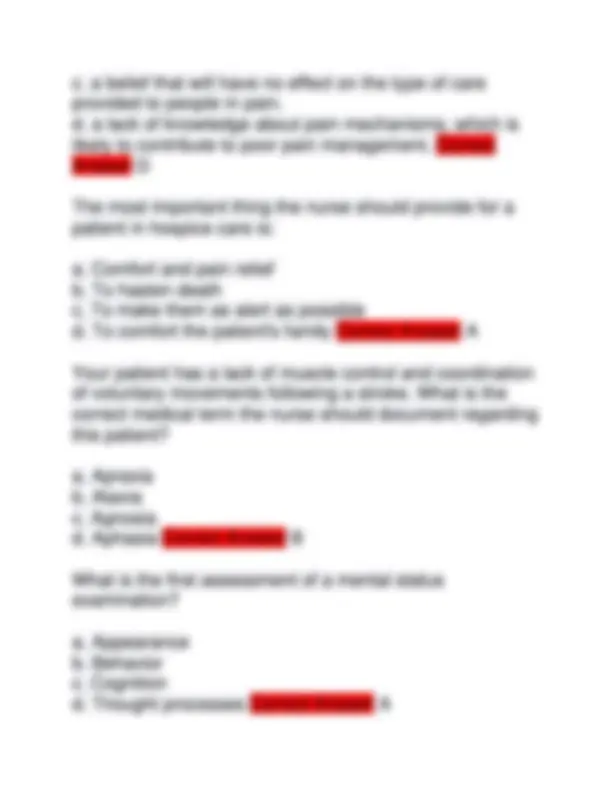





Study with the several resources on Docsity

Earn points by helping other students or get them with a premium plan


Prepare for your exams
Study with the several resources on Docsity

Earn points to download
Earn points by helping other students or get them with a premium plan
Community
Ask the community for help and clear up your study doubts
Discover the best universities in your country according to Docsity users
Free resources
Download our free guides on studying techniques, anxiety management strategies, and thesis advice from Docsity tutors
2025 NUR 325 EXAM 1 NEWEST QUESTIONS AND DETAILED CORRECT ANSWERS (VERIFIED ANSWERS) WITH RATIONALES | A+ GRADE 2025-2026
Typology: Exams
1 / 80

This page cannot be seen from the preview
Don't miss anything!









































































The nurse plans care for a 16-year-old male, taking into consideration that stressors experienced most commonly by adolescents include which of the following? a. Loss of autonomy caused by health problems b. Physical appearance, family, friends, and school c. Self-esteem issues, changing family structure d. Search for identity with peer groups and separation from family Correct Answer D (Stressors that apply to preadolescents are self-esteem issues and a changing family structure. A loss of autonomy caused by health problems applies to the older adult. Stressors that apply to children are physical appearance, family, friends, and school.) When assessing an older adult who is showing symptoms of anxiety, insomnia, anorexia, and mild confusion, one of the first assessments includes which of the following? a. The amount of family support b. A 3-day diet recall c. A thorough physical assessment d. Threats to safety in her home Correct Answer C (Stress often causes symptoms similar to physical illnesses.
Physical causes for problems need to be investigated and treated before treatment for stress-related symptoms can be initiated.) A 34-year-old single father who is anxious, tearful, and tired from caring for his three young children tells the nurse that he feels depressed and doesn't see how he can go on much longer. Which of the following would be the nurse's best response? a. "Are you thinking of suicide?" b. "You've been doing a good job raising your children. You can do it!" c. "Is there someone who can help you during the evenings and weekends?" d. "What do you mean when you say you can't go on any longer?" Correct Answer D (You need to get information about what the gentleman means when he says he can't go on any longer. He might be thinking of turning his children over to a grandparent or seeking other child-care arrangements. Asking about suicide initially might be premature. Asking, "Are you thinking of suicide?" prematurely might shut the patient down entirely. If the patient talks about suicide, for safety reasons it is very important to further discuss his suicidal thoughts and refer to the appropriate health care professional. Asking the open-ended question provides an opportunity to understand what the person is thinking and open lines of communication.)
c. How is having diabetes affecting your life? d. I know this must be hard for you. Let me tell you what might help. e. Do you have any changes in lifestyle habits: sleeping, eating, smoking, and drinking? Correct Answer A B E (A developmental crisis occurs as a person moves through the stages of life, including widowhood. It is important to gather information about how this crisis affects her interactions, coping with loneliness, and any changes in lifestyle habits. Although stress can affect diabetes, there is nothing in this situation that states that the woman has diabetes. Saying, "I know this must be hard for you. Let me tell you what might help" is unacceptable, because the whole purpose of assessment is to gather data and let the patient tell his or her story.) After a health care provider has informed a patient that he has colon cancer, the nurse enters the room to find the patient gazing out the window in thought. Which of the following are appropriate responses or actions of the nurse? (Select all that apply.) a. "I know another patient whose colon cancer was cured by surgery." b. Straighten the patient's bed and room c. "Have you thought about how you are going to tell your family?" d. "Would you like for me to sit down with you for a few minutes so you can talk about this?"
e. Sit quietly with the patient Correct Answer D E ( Sitting quietly or asking the patient if he would like you to sit down for a few minutes so he can talk are both effective. This provides the patient some quiet time, knowing that someone is there. Allowing the patient to talk allows the nurse to assess the patient's fears, knowledge, and perception of the situation, which is of utmost importance. The other responses are telling the patient what to do or giving reassurance, and the situation does not call for either of these.) The nurse is evaluating the coping success of a patient experiencing stress from being newly diagnosed with multiple sclerosis and psychomotor impairment. Which of the following statements indicate that the patient is beginning to cope with the diagnosis? (Select all that apply.) a. "I'm going to learn to drive a car so I can be more independent." b. "My sister says she feels better when she goes shopping, so I'll go shopping." c. "I'm going to let the occupational therapist assess my home to improve efficiency." d. "I've always felt better when I go for a long walk. I'll do that when I get home." e. "I'm going to attend a support group to learn more about multiple sclerosis." Correct Answer C E (Inviting the occupational therapist into the patient's home and attending support groups are early indicators that the patient is recognizing some of the challenges of the
daughter will fall behind in special-school classes during hospitalization. Which strategies are effective in helping this mother cope with these stressors? (Select all that apply.) a. Referral to social service process reestablishing the child's disability payment b. Sending the child home in 72 hours and having the child return to school c. Coordinating hospital-based and home-based schooling with the child's teacher d. Teaching the mother signs and symptoms of a respiratory tract infection e. Telling the mother that the stress will decrease in 6 weeks when everything is back to normal Correct Answer A C D (The stressors for this parent are her child's illness, missing school, and loss of disability payments. Obtaining resources to resolve these stressors will reduce the mother's stress load and allow her to focus on helping her child improve and preventing another respiratory tract infection. Discharging the child in 72 hours with a return to school may not be best for the child's physical condition and may make the situation worse. Giving the mom a 6-week time frame is unrealistic because everyone's time frame is different. The mom may also need to adjust to a "new normal.") A staff nurse is talking with the nursing supervisor about the stress that she feels on the job. Which of the following are true about work-related stress? (Select all that apply.)
a. Job-related stress can affect the quality of patient care. b. Stress can affect nurses' efficiency and decision making. c. Nurses who talk about feeling stress are unprofessional and should calm down. d. Nurses frequently experience stress with the rapid changes in health care technology. e. Nurses cannot resolve job-related stress. Correct Answer A B D (Nurses frequently experience stress with the rapid changes in health care and when the situation seems out of their personal control. When job stress remains unresolved, patient care and clinical decision making can be affected because the stress is perceived as uncontrolled and all consuming.) A nurse is assessing a patient's stressor to determine if it is a threat. What type of appraisal is this? a. Primary b. Secondary c. Tertiary d. Engagement Correct Answer A A nurse is evaluating their resources to over, eliminate, or reduce the stressor. What type of appraisal is this? a. Primary b. Secondary c. Tertiary
this patient, the nurse knows to add which tertiary interventions to the patient's plan of care: a. Counseling b. Screening for stress-related diseases c. A rehabilitation program focused on stress management d. A daily exercise program Correct Answer C (In planning tertiary prevention care for a patient undergoing treatment related to stress, the nurse knows that including recommendations for a rehabilitation program focused on stress management is part of creating tertiary care. The purpose of tertiary care is focused on prevention and rehabilitation of the patient. Option A is incorrect. Counseling is a primary prevention strategy focused on health promotion and protection. Option B is incorrect; screening for stress-related diseases is part of secondary prevention, which focuses on early diagnosis and screening of diseases. Option D is incorrect. Planning a daily exercise program is part of secondary prevention strategies, which focuses on early diagnosis and treatment.) Which nursing interventions are likely to help the patient to cope by addressing the mediators of stress? (Select all that apply.) a. "A divorce, while stressful, can be the beginning of a new, better phase of life." b. "You said you used to jog; getting back to aerobic exercise could be helpful."
c. "Journaling gives one more awareness of how experiences have affected them." d. "Perhaps a short-term loan from your father will make your layoff less stressful." e. "Slowing your breathing by counting to three between breaths will calm you." f. "I have found a support group for newly divorced persons in your neighborhood." Correct Answer A C D F (Stress mediators are factors that can help persons cope by influencing how they perceive and respond to stressors; they include personality, social support, perceptions, and culture. Suggesting that a divorce may have positive as well as negative aspects helps the patient to alter his perceptions of the stressor. Journaling increases self-awareness regarding how life experiences may have shaped how one perceives and responds to stress (or how one's personality affects how one responds to stressors). A loan could help the patient perceive a layoff differently by reducing the financial pressures that accompany it. Participation in support groups is an excellent way to expand one's support network relative to specific issues. However, neither aerobic exercise nor breathing-control exercises, while helpful in other ways, affect stress mediators.) A diabetic patient who is hospitalized asks the nurse what factors are associated with increased blood glucose while in the hospital? Which response(s) by the nurse are appropriate? (Select all that apply.)
c. "Including exercise in your schedule will just increase the stress from work." d. "Regular exercise would be good because it helps the body deal with stress." Correct Answer D (Exercise is a form of emotion-based coping that increases a feeling of well-being. Cutting back on hours may not be an option in his current work climate, although it might help reduce stress. There are other nonpharmacologic methods that may help with stress, such as music or meditation, which would not involve possible side effects from medications. Exercise will decrease feelings of stress when balanced with the time requirements of the stressor.) The nurse is assessing a patient's coping abilities related to expected placement in a long-term care facility. Which risk factor is of most concern to the nurse? a. The patient's family members all live several hours away. b. The patient is a retired police officer. c. The patient was recently diagnosed with Alzheimer's disease. d. The patient will need assistance in moving from his home. Correct Answer C (Poor cognition is a key risk factor for poor coping because the patient has difficulty assessing a situation and making decisions that allow a sense of control. Limited support is a risk factor, but decreased cognition adds to the patient's inability to understand changes. A retired police officer would typically have experienced stress and have some strengths in managing stress. Needing assistance to move
is a short-term need; the inability to understand the need for the move or a new situation because of poor cognitive function is the greater concern.) The nurse is assessing the coping abilities of a patient recently diagnosed with a degenerative neuromuscular disease with no known cure. Which statement by the patient alerts the nurse that more intervention is needed? a. "I have decided to take some art lessons at the community center." b. "I am sleeping much better when I have two drinks and smoke before bed." c. "I am scheduling a family reunion for the upcoming holiday.' d. "I have decided to sell my house and move into an apartment with my son." Correct Answer B (Using alcohol, smoking, or drugs to enhance sleep is not a positive coping mechanism, and it is also a safety hazard; other interventions should be enlisted to help the patient cope with the devastating diagnosis. Taking art lessons and planning a family reunion are positive ways to not focus on the illness and keep the patient from becoming more isolated. Moving in with a family member is a problem- solving strategy that allows the patient to maintain more control over the illness outcome.) A nurse has begun working in a new unit with high-acuity patients who are scheduled for numerous diagnostic tests before being transferred to the appropriate medical or surgical unit. She also has care responsibilities for her
b. Discuss the code with colleagues and chalk it up as part of a day's work. c. Reflect on what could have been done better and vow to be better next time. d. Debrief with other health care professionals who were involved with the resuscitation and talk about how the nurse feels. Correct Answer D (Debriefing is an example of a positive coping strategy that will help the nurse process the events and prevent burnout. Having a drink afterward may lead to alcohol abuse and will not serve as a debriefing strategy. Death of a patient is a traumatic event even when death is a common occurrence some health care settings. Reviewing resuscitations can be useful if done to improve overall care; however, the nurse should talk about the events as well.) The nurse is developing a discharge plan for a patient who was recently diagnosed with diabetes. What information about the patient does the nurse need to determine whether the patient has effective coping strategies in place to carry out the plan of care? a. Support available for the patient at home b. The highest grade the patient completed in school c. The financial resources available d. The patient's confidence level Correct Answer D (Effective coping is related to how confident the individual is and does not depend on one's education level. Support at home is important; however, this question is asking about the patient's ability. Support at home will assist the
patient in reaching his or her goals. Financial security may help with the cost of care.) The pediatric operating room nurse is working with a child and his family as the child undergoes surgery to repair a cleft palate. When the nurse enters the family waiting area to inform the parents of how the procedure went, the father yells at the nurse and asks, "What took you so long?" What nursing interventions would be most effective to respond to this situation? a. Emotion-focused coping strategies b. Problem-focused coping strategies c. Cognitive restructuring d. Develop an action plan Correct Answer A (The parent is exhibiting misplaced aggression aimed toward the nurse. Emotion-focused coping strategies address the feelings one has as a result of the stressor. This will assist the parent in talking about his fears. Problem-focused coping strategies are most commonly applied when stressors can be modified, changed, or controlled. Cognitive restructuring is when an individual is encouraged to look at the stressor from other perspectives. The nurse can assist the parent with an action plan, which will assist in determining various coping methods in various situations and develop an individualized plan.) The nurse is completing a care plan for a patient who is exhibiting poor coping after receiving a serious medical diagnosis. Which interventions would the nurse consider? (Select all that apply.)
d. Adolescents attending summer camps Correct Answer A (The primary risk factor for cognitive impairment is advancing age; males with a history of stroke or diabetes are at significant risk. Older females with a history of poor health, insomnia, and lack of social support are at risk for cognitive impairment, not those who are overweight. Risk factors for young adults include substance abuse and high-risk behaviors, not crowded living conditions. Adolescents who attend summer camp are not necessarily at risk for cognitive problems; adolescents who participate in high-risk behaviors would be at risk.) A 90-year-old patient is admitted to the hospital. Shortly after admission, the family notices that the patient is exhibiting disorientation and agitation. When questioned about the behavior by the family, the nurse states that the patient is at risk for developing which common complication of hospitalization in older adults? a. Delirium b. Dementia c. Alzheimer's disease d. Sundowner syndrome Correct Answer A (Delirium, which occurs over hours to a few days, is the most frequent complication of hospitalization in the elderly population. Dementia occurs over a period of months. Alzheimer's disease develops over months to years. Sundowner syndrome is most prominent in dementia and becomes worse in the evenings.)
The nurse is reviewing the needs of a patient with cognitive impairment. What is the priority concern that the nurse should address for this patient? a. Promoting at least 6 hours of sleep a night b. Encouraging an oral intake of 1200 calories per day c. Managing the patient's pain from arthritis d. Supervising medication administration Correct Answer D (Safety is the priority concern for the cognitively impaired patient; safely taking medication addresses safety needs for the patient. Sleep, nutrition, and management of pain are important components of the patient's care and can affect overall health, but safety is the highest priority.) A patient recently admitted to the hospital has been diagnosed with delirium. The family of the patient asks the nurse to explain what delirium is. How should the nurse respond? a. Delirium is reversible with treatment of the underlying cause. b. Delirium is progressive and has no known cure. c. Delirium affects a specific area of cognitive functioning. d. Delirium indicates the onset of a cerebrovascular accident. Correct Answer A (Delirium can be reversible with treatment of the precipitating problem and control of predisposing factors. Dementia is progressive and irreversible. Focal cognitive disorders affect a single area of cognitive functioning. Memory and orientation may be